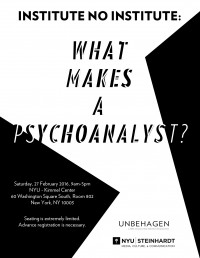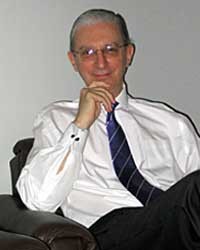INSTITUTE NO INSTITUTE: What Makes a Psychoanalyst?
Becoming a psychoanalyst is founded upon a subjective transformation that occurs in a personal analysis. It cannot be measured or predicted, yet it is the necessary factor that allows one to conduct analytic treatment. Neither the analyst alone nor a group of independent observers can determine its occurrence, but somehow together they may. That something so difficult to determine lies at the heart of professional transmission has troubled the field of psychoanalysis from its inception. Institutes, schools, and broader communities of psychoanalysts have struggled to harness this transformation to formal models of training. They have invariably encountered obstacles in the structures of authority and the exercise of power. While training outside institutions is not explicitly subject to the...Read More
Manifesto Fest in DIVISION/Review
A group, including many Unbehagen members, presented a Manifesto Fest at the 2015 Division 39 Spring meeting in San Francisco. Click here to read the manifestos of Will Braun, Jill Gentile, Lynne Layton, Tiffany McLain, Tracy Morgan, Jonathan Shedler, Esther Sperber & Robert Stolorow, published in DIVISION/Review (posted with permission from DIVISION/Review).
Stuart Schneiderman: The Last Psychoanalyst!
Does Psychoanalysis Have a Future …Or, Is It All in the Past? From Stuart Schneiderman: “I want to address the question posed by my book, The Last Psychoanalyst, that when Lacan declared that psychoanalytic practice was a ‘swindle’ or scam (escroquerie) he was trying to save it. By trying to make it into an international cult he was trying to keep it alive as one front in the culture war against Anglo-American cultural hegemony. He believed that psychoanalysts do better not to try to defend their practice by claiming to produce positive clinical outcomes. He had already said that good results are an accident of psychoanalysis. He wanted to retain it as a type of initiation ritual into the kinds of mental habits that would be required of those who could fight the good culture war. Fin...Read More





